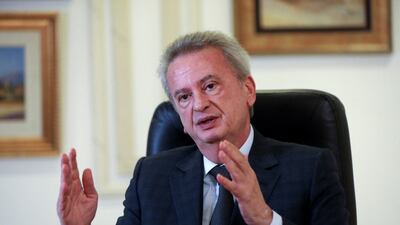Calls for Riad Salameh's resignation are intensifying after the French judiciary confirmed on Friday that it has issued an arrest warrant for Lebanon's central bank governor and requested a Red Notice from Interpol.
This came after Mr Salameh failed to attend a hearing in Paris on Tuesday.
The French judiciary, along with five other European countries, suspects Mr Salameh of having siphoned off huge sums from the Banque Du Liban through an embezzlement scheme with the help of his brother, Raja.
He is also accused of having falsified banking statements to cover up allegations of illicit enrichment.
Riad and Raja Salameh deny these allegations.
“He has now become a fugitive in the eyes of French law,” said William Bourdon, a lawyer for the two civil parties in the case, the Collective Association of Victims of Fraudulent and Criminal Practices in Lebanon, and Sherpa, an anti-financial crime NGO in France.
Mr Salameh said on the day as the decision that he would appeal against the warrant.
But Mr Bourdon said this was not possible.
“It's a smokescreen. One cannot challenge an arrest warrant: evading justice means for a suspect to forfeit their rights,” Mr Bourdon said.
Mr Salameh remains in office and is also the president of the special investigation committee for money laundering and financing of terrorism.
The arrest warrant did not come as a surprise, as Reuters had previously reported that the French judge notified Mr Salameh ahead of the hearing about her intention to press preliminary charges.
In February, the Lebanese judiciary also charged Riad Salameh, his brother Raja and an assistant with money laundering, embezzlement and illicit enrichment, as part of a parallel probe.
“In any other country, his resignation would have been inevitable,” a European diplomat told The National.
“The fact that he long enjoyed political backing from the highest levels is a clear sign of the regime's systemic flaws. It will take more than just resignation to restore international trust in Lebanon's governance.”
Growing calls for resignation
Once a revered figure in the financial world, Mr Salameh's reputation as the guardian of Lebanon's financial sector began to fade as an economic crisis has unfolded in recent years. This follows decades of corruption and mismanagement by the country's ruling classes.
Despite facing increasing international and local judicial pressure since 2021, the governor managed to retain a significant portion of his political support.
But for many, the arrest warrant is the final straw, leading to numerous calls demanding the governor's resignation.
This includes top officials such as Saade Chami, Lebanon’s caretaker deputy prime minister, who said that the corruption allegations against Mr Salameh “could threaten Lebanon's financial relations with the rest of the world”, including with the International Monetary Fund.
Mr Chami is heading the negotiations to unlocking $3 billion in aid from the IMF.
Some of Lebanon's biggest political parties across the political spectrum have also officially called for his resignation.
A spokeswoman for the Free Patriotic Movement, one of the largest Christian parties, which is allied with the Iran-backed Hezbollah, told The National that they “believe Riad Salameh should resign”.
Their main rival, the Christian party Lebanese Forces, said the international arrest warrant “necessitates his resignation and imposes on the government the responsibility of immediately appointing the right successor”.
Ten opposition MPs published a joint statement demanding “the removal of Riad Salameh from his position, as soon as possible”.
Hezbollah chief Hassan Nasrallah previously said the powerful Iran-backed party was against Mr Salameh's mandate's extension.
The shift is also noticeable among those who were once close to Mr Salameh, including Parliament Speaker Nabih Berri, with whom he had collaborated closely since assuming leadership of the central bank in 1993, and caretaker Prime Minister Najib Mikati, who had made clear he will not renew Mr Salameh's mandate.
Following this turnaround, Mr Salameh appears to be willing to hold the political class accountable.
“I advise the judiciary to start with the politicians and not the central bank governor,” he said in an interview with Al Hadath news channel on Thursday.
This leaves the question of Mr Salameh's succession unresolved. His mandate is set to expire in July and he repeated that he would not seek an extension.
Lebanon's highly polarised political scene is at odds regarding his successor.
Hezbollah is advocating for deputy governor Wassim Mansouri to assume the role on an interim basis until the country has a new president.
On the other hand, the Lebanese Forces argue for a new governor to be appointed, despite the presidential vacuum, while the FPM said that the situation necessitates the appointment of a judicial guardian.
This could potentially spark a new deadlock, as the country is already engulfed in a serious leadership crisis, without a president or fully empowered government.


